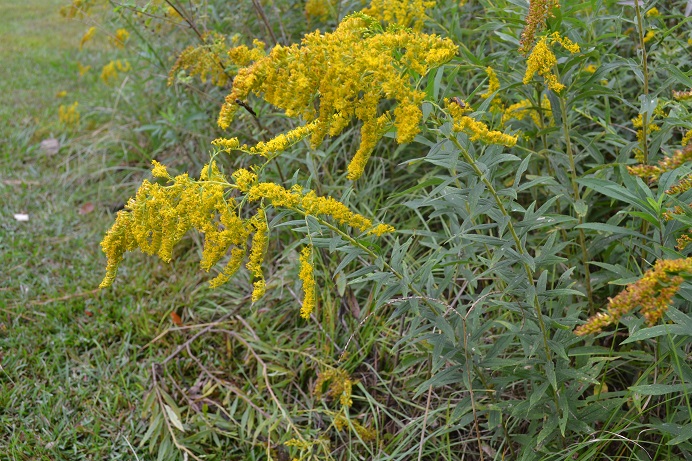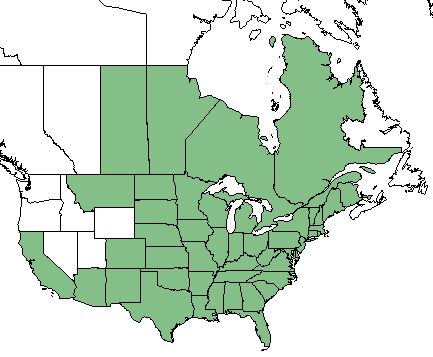Difference between revisions of "Solidago altissima"
(→Distribution) |
|||
| Line 34: | Line 34: | ||
===Phenology=== <!--Timing off flowering, fruiting, seed dispersal, and environmental triggers. Cite PanFlora website if appropriate: http://www.gilnelson.com/PanFlora/ --> | ===Phenology=== <!--Timing off flowering, fruiting, seed dispersal, and environmental triggers. Cite PanFlora website if appropriate: http://www.gilnelson.com/PanFlora/ --> | ||
| − | + | Flowering occurs from August through November.<ref name="Weakley 2015"/><ref name="PanFlora">Nelson G (18 January 2018) PanFlora. Retrieved from gilnelson.com/PanFlora/</ref> | |
<!--===Seed dispersal===--> | <!--===Seed dispersal===--> | ||
<!--===Seed bank and germination===--> | <!--===Seed bank and germination===--> | ||
Revision as of 16:40, 18 January 2018
| Solidago altissima | |
|---|---|

| |
| Photo by Kevin Robertson | |
| Scientific classification | |
| Kingdom: | Plantae |
| Division: | Magnoliophyta - Flowering plants |
| Class: | Magnoliopsida - Dicots |
| Order: | Asterales |
| Family: | Asteraceae |
| Genus: | Solidago |
| Species: | S. altissima |
| Binomial name | |
| Solidago altissima L. | |

| |
| Natural range of Solidago altissima from USDA NRCS Plants Database. | |
Common Name(s): tall goldenrod; Great Plains tall goldenrod; southern tall goldenrod;[1] Canada goldenrod[2]
Contents
Taxonomic Notes
Varieties: S. altissima var. altissima; S. altissima var. pluricephala;[1][2] S. altissima var. gilvocanescens;[1] S. altissima var. procera[2]
Synonym(s): S. canadensis var. scabra; S. hirsutissima;[1][2] S. pruinosa; S. canadensis var. gilvocanescens;[1] S. lunellii[2]
Description
Solidago altissima is a dioecious perennial forb/herb.[2]
Distribution
This species is found in all of the lower 48 United States, excluding Washington, Oregon, Nevada, Utah, Idaho, and Wyoming. It also occurs in the Canadian provinces of Saskatchewan, Manitoba, Ontario, Quebec, and New Brunswick.[2]
Ecology
Habitat
S. altissima is found in fields, roadsides, and disturbed areas.[1]
Phenology
Flowering occurs from August through November.[1][3]
Conservation and Management
Cultivation and restoration
Photo Gallery
References and notes
- ↑ 1.0 1.1 1.2 1.3 1.4 1.5 1.6 Weakley AS (2015) Flora of the Southern and Mid-Atlantic States. Chapel Hill, NC: University of North Carolina Herbarium.
- ↑ 2.0 2.1 2.2 2.3 2.4 2.5 2.6 USDA NRCS (2016) The PLANTS Database (http://plants.usda.gov, 118 January 2018). National Plant Data Team, Greensboro, NC 27401-4901 USA.
- ↑ Nelson G (18 January 2018) PanFlora. Retrieved from gilnelson.com/PanFlora/